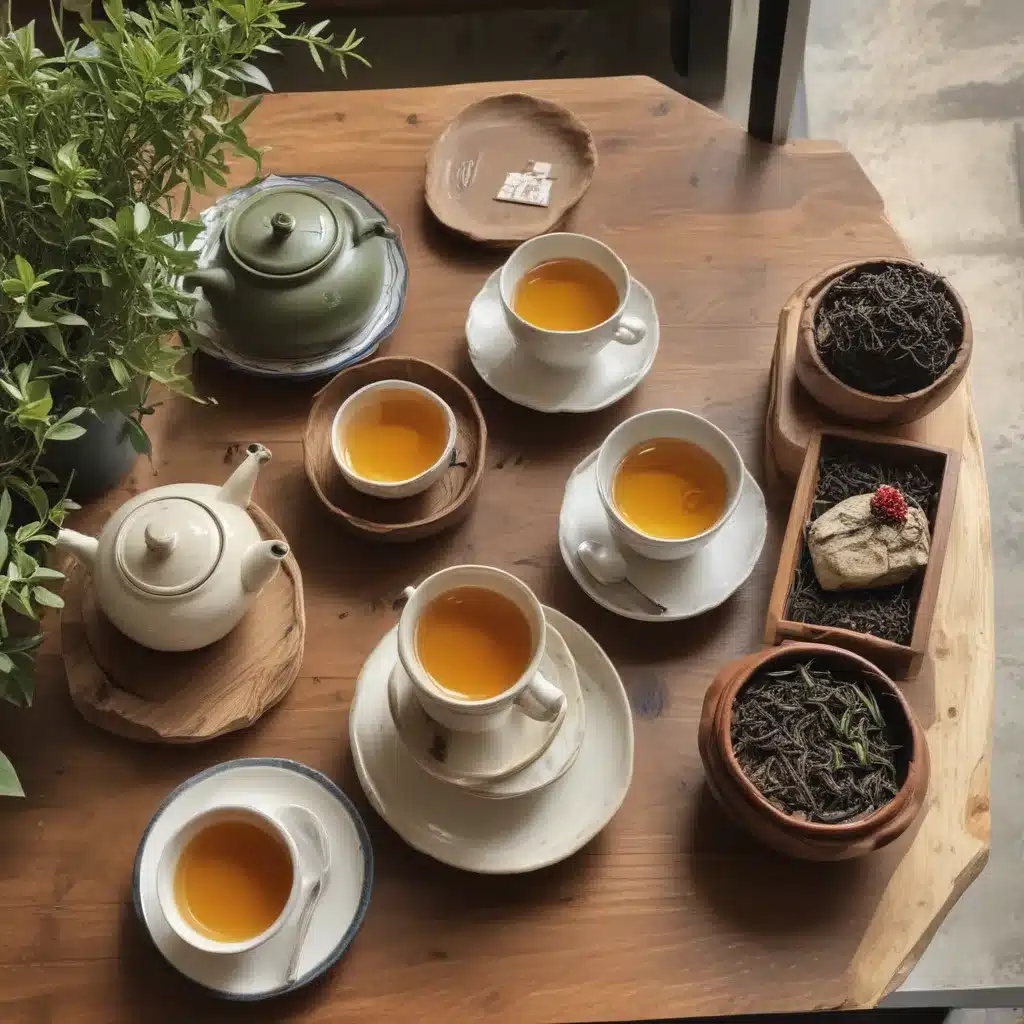
Discovering the Allure of Korean Tea Culture in Boston
As a self-proclaimed tea enthusiast, I’ve always been intrigued by the rich cultural traditions that surround the art of tea-making. And when I moved to Boston, I couldn’t wait to dive headfirst into the city’s burgeoning Korean tea scene. Little did I know that my explorations would uncover a world of exquisite flavors, soothing aromas, and genuine hospitality that would captivate my senses and leave a lasting impression.
My journey began at a charming little café nestled in the heart of Allston, where the aroma of freshly brewed Korean tea greeted me as soon as I stepped through the door. As I took a seat, I couldn’t help but be mesmerized by the serene ambiance, with its clean lines, natural wood accents, and delicate tea ceremony props that adorned the shelves. I knew in that moment that I was about to embark on a truly authentic Korean tea experience.
The owner, a gracious and knowledgeable host, approached me with a warm smile and asked if I’d like to try their signature tea selection. Without hesitation, I nodded enthusiastically, eager to learn more about the intricacies of Korean tea culture. As she carefully prepared the tea, meticulously measuring the leaves and adjusting the water temperature, I couldn’t help but be captivated by the ritual unfolding before me.
The Art of Korean Tea Brewing: A Sensory Delight
The first sip of the fragrant brew was a revelation. The tea’s delicate floral notes and subtle sweetness danced across my palate, and I found myself transported to a serene garden in the heart of the Korean countryside. As I savored each subsequent sip, I noticed the nuances in flavor and aroma, each one more captivating than the last.
I learned that the art of Korean tea brewing is a delicate balance of science and tradition, where every step, from the selection of the leaves to the precise water temperature, is crucial in unlocking the tea’s true potential. The owner explained that the tea I was enjoying, a premium Korean green tea, was carefully sourced from a small, family-owned farm in the Boseong region, known for its lush tea plantations and mild, misty climate.
As I listened, I couldn’t help but feel a sense of wonder at the level of care and attention that went into creating this exquisite beverage. It was more than just a simple cup of tea – it was a cultural experience, a journey into the heart of Korean tea traditions.
Exploring the Diversity of Korean Tea Varieties
Inspired by my initial encounter, I decided to embark on a deeper exploration of the Korean tea scene in Boston, visiting various cafes and discovering the diverse array of offerings. From the earthy and robust Pu-erh teas to the delicate and floral Balhyocha, each tea I sampled told a unique story, reflecting the rich tapestry of Korean tea culture.
One memorable visit led me to a cozy café in the heart of Chinatown, where the owner, a passionate tea enthusiast, proudly presented me with a selection of rare and specialty Korean teas. As I sipped on a fragrant Sejak green tea, he regaled me with tales of his travels to the remote tea-growing regions of Korea, where he had forged relationships with small-scale producers dedicated to preserving traditional tea-making methods.
I was captivated by his enthusiasm and the depth of his knowledge, which extended far beyond the tea itself. He spoke of the cultural significance of tea ceremonies, the intricate tea brewing techniques, and the ways in which tea has been woven into the fabric of Korean life for centuries.
The Allure of Korean Tea Ceremonies
As my exploration continued, I discovered that the true essence of Korean tea culture goes beyond the simple act of drinking tea. It is a holistic experience that encompasses everything from the delicate ceramics used in the tea service to the carefully choreographed tea ceremonies that have been passed down through generations.
At a charming tea house in the historic North End, I had the opportunity to participate in a traditional Korean tea ceremony, guided by a gracious and knowledgeable hostess. As I sat cross-legged on the floor, surrounded by the serene ambiance and the sound of softly chiming bells, I felt a sense of tranquility wash over me.
The ceremony unfolded with a mesmerizing rhythm, each movement precise and purposeful. The hostess meticulously cleaned the tea utensils, measured the leaves, and heated the water to the perfect temperature. As she poured the tea into the delicate porcelain cups, I couldn’t help but hold my breath, captivated by the sheer elegance and mindfulness of the ritual.
With each sip, I felt a deeper connection to the rich cultural heritage that had been so carefully preserved and shared with me. The tea itself was exquisite, of course, but it was the entire experience – the sights, sounds, and the sense of reverence that permeated the space – that truly left an indelible mark on me.
Embracing the Communal Spirit of Korean Tea Culture
As I continued to explore the Korean tea scene in Boston, I was struck by the strong sense of community and camaraderie that seemed to permeate these spaces. Whether it was a lively conversation between the owner and a regular customer or the shared moments of quiet reflection during a tea ceremony, there was a palpable feeling of connection that extended beyond the simple act of drinking tea.
At one particular café, I found myself drawn into a spirited discussion with a group of local tea enthusiasts, each of whom had their own unique perspectives and experiences to share. We traded stories about our favorite tea-growing regions, discussed the nuances of brewing techniques, and even exchanged tips on how to properly store and preserve tea leaves.
What struck me most, however, was the genuine sense of warmth and inclusiveness that characterized the entire experience. There were no pretenses or airs of exclusivity – just a genuine passion for the art of tea-making and a desire to share it with anyone who was willing to listen.
Discovering the Health Benefits of Korean Teas
As I delved deeper into the world of Korean tea, I couldn’t help but be intrigued by the wealth of health benefits that these beverages offer. From the antioxidant-rich Pu-erh teas to the immune-boosting properties of the Balhyocha, each variety seemed to hold a unique set of wellness-enhancing qualities.
At one café, I had the opportunity to engage in a fascinating conversation with a tea expert who had spent years studying the science behind the health benefits of Korean teas. He explained that many of these teas are rich in polyphenols, which have been shown to promote cardiovascular health, reduce inflammation, and even support cognitive function.
I was particularly fascinated by his discussion of the Balhyocha tea, a unique fermented variety that is believed to aid in digestion and gut health. As someone who has struggled with digestive issues in the past, I couldn’t wait to incorporate this tea into my daily routine.
Bridging Cultures through Korean Tea
As my exploration of the Korean tea culture in Boston came to a close, I couldn’t help but feel a deep sense of appreciation for the way in which these charming cafes were bridging the gap between cultures. Through their dedication to preserving and sharing this important aspect of Korean heritage, they were not only introducing a new generation of tea enthusiasts to the wonders of Korean tea, but also fostering a deeper understanding and appreciation for Korean culture as a whole.
One particularly memorable experience was at a café in the heart of Chinatown, where the owner had curated a stunning collection of traditional Korean tea ceremony sets, each one more beautiful and intricate than the last. As I admired the delicate craftsmanship of the ceramics, the owner shared with me the rich history and symbolism behind each piece, weaving a tapestry of cultural significance that left me in awe.
It was in moments like these that I truly realized the power of tea to bring people together, to transcend language barriers and cultural divides, and to create a shared sense of wonder and appreciation. And as I sipped my final cup of fragrant Korean tea, I knew that this was just the beginning of my journey into the captivating world of Korean tea culture.
So, if you find yourself in Boston, be sure to seek out these charming cafes and immerse yourself in the rich tapestry of Korean tea traditions. Who knows – you might just discover a new-found love for this ancient art form, just as I have.
Visit Korean Garden Boston to explore authentic Korean cuisine and tea experiences in Boston!
